The main problem with focus, as with most things in life, is moderation: look at something too intentlty and you may miss out on an important detail, off to the side (just ask Robert Muldoon). And while the core components of Horizon: Zero Dawn appear polished and worthwhile, looking past them reveals a kaleidoscope of Mirrored Experiences and vast tracts of Missed Opportunity.
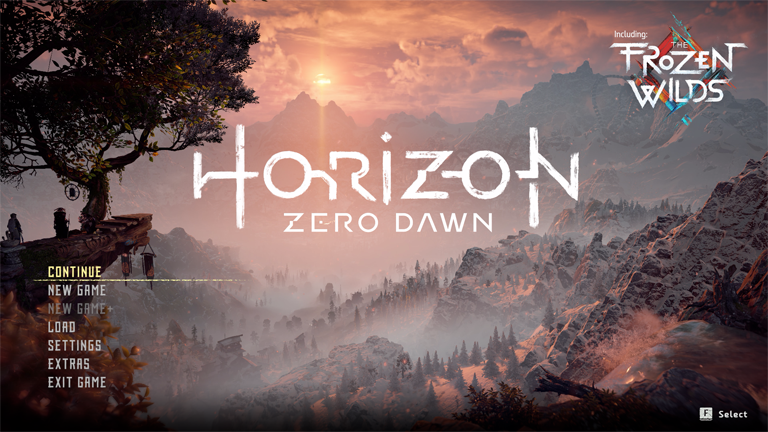
In Horizon, you play Aloy – a young girl raised in isolation by her adoptive guardian Rost. Set apart from the rest of her people (the Nora tribe), Aloy is plagued by many nagging questions: Where did she come from? Who were her parents? Why was she exiled from the tribe? Rost informs her that her path to knowledge lies in winning the Nora trials – a grueling coming-of-age test that pits prospective braves against nature and each other. If she manages to finish this test first, she will not only get her answers but also be welcomed back into the tribe.
Aloy grows up preparing for the trials with single-minded determination and seems to be on the cusp of realizing her aim for when – on the very day – things go off-script in a major way thrusting her into a 60 hour narrative that holds the fate of her world in the balance.
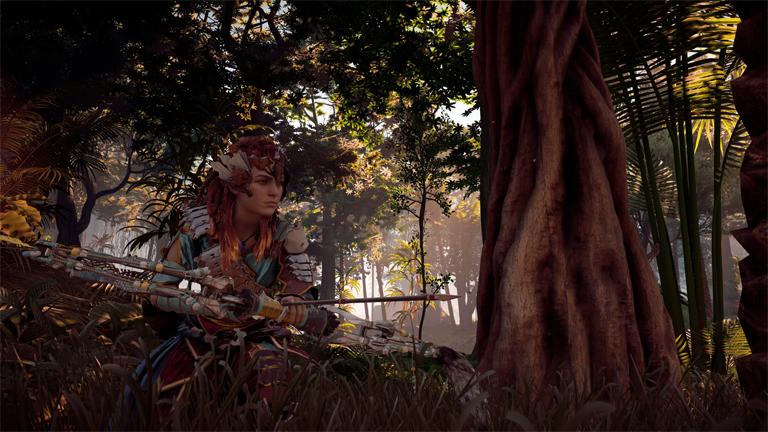
In terms of Things Done Right, world-building is Horizon's greatest achievement by far. A distant, but relatable, future-earth returned to nature, with only scant ruins of metropoli to be seen under centuries of greenery, the world of Horizon: Zero Dawn is as beautiful as it is forbidding and forlorn.
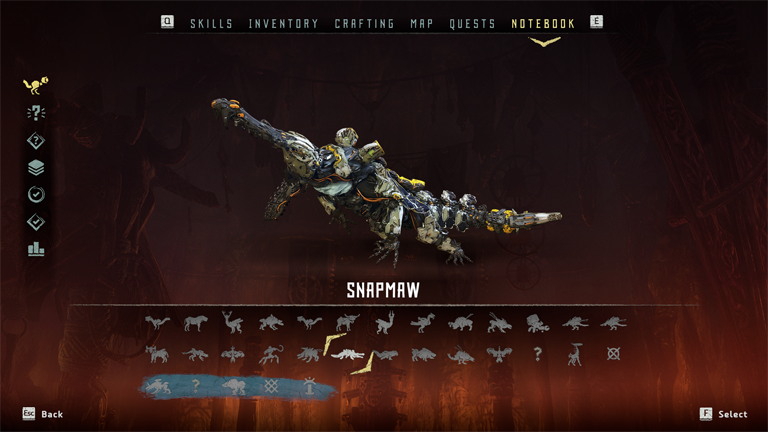
Humanity is no longer the dominant life form and reduced to living in scattered communities and tribes, which (hilariously) still war with each other whenever they are not threatened by Machines (mechanical constructs which roam the wilderness and seemingly imitate extinct animal life forms).
Running on the same Decima engine that breathed life into Killzone: Shadow Fall and, later, Death Stranding, Aloy's world is a wonder to behold with verdant flora, somewhat limited – but adorable – fauna, a day/night cycle, dynamic weather, burbling streams, heart-rending sunsets and some of the best snow I have ever seen in a game.
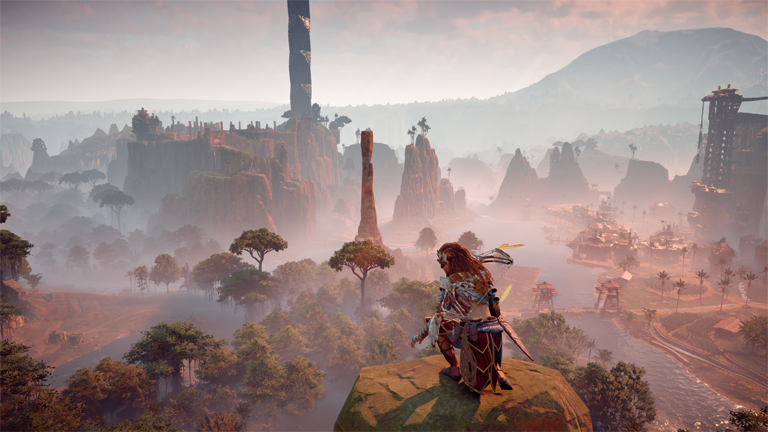
The contrast of new growth and remnants of ancient human development only compounds the charm and lends a certain reverie to any new discovery, like a robot bound in the roots of a giant tree or an underground hangar in the middle of a frozen wasteland. Exploring Horizon's world is a constant pleasure and never gets old... Sadly, the same cannot be said for the gameplay.
If I had to sum it up in one word, Horizon's main (and possibly only) fault would be Scope, which is so limited as to quickly become repetitious.
The game's visuals are beautiful, its animations (including subtle facial expressions) – spot on; it has a solid narrative (penned by F:NV's John Gonzalez, no less), great voice acting, and decent – if limited – gameplay mechanics (it is essentially a 3rd-person action game with a leveling system and crafting).
In of themselves, none of the gameplay elements are bad – but there are simply too few of them to span the game's overbearing length and once you are acquainted with how they work the game is content to rest on its laurels and never throw any new elements your way.
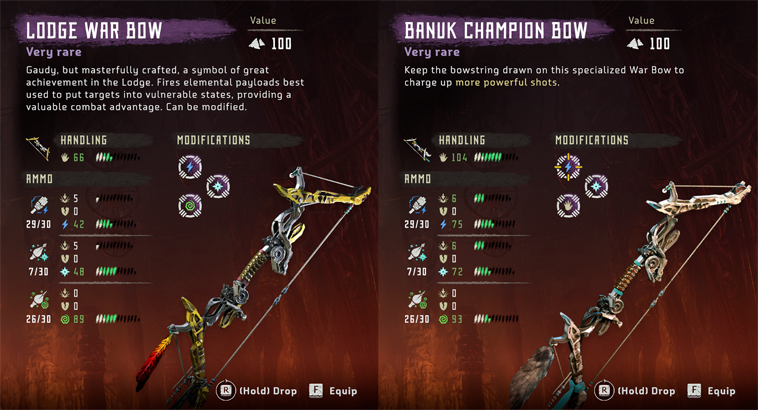
Take Aloy's weapons. While, in theory, there are 33 basic weapons for the Nora huntress to employ, in reality there are only about a dozen unique visual assets which the game then re-skins and offers with different stats as "new." It's an approach that was old in Mass Effect – four years before work on Horizon even started – and it hasn't aged well at all. If the main focus of your game is combat, then weapon variety should have clearly been an easy way to keep players engaged. Why Guerilla, with its extensive shooter experience, missed out on that seemingly obvious fact is beyond me.
Or the crafting system, which only exists to provide you with consumables or ammunition and does nothing to alter the function or visuals of items. Or the collectibles, which yield underwhelming returns after the effort it takes to gather them. Or the combat, which is new and refreshing the first few times you undertake it, but gets stale quickly when it is all you do for 60 hours.
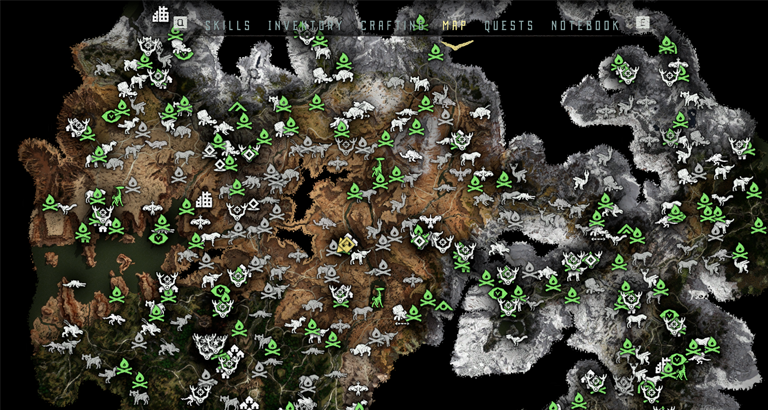
Basically, it seems like Guerilla was so enamored with the world they conceived that they forgot to populate it with an adequate amount of Things To Do. Compared to the setting and the core narrative, the gameplay quickly turns underwhelming, with cookie-cutter side-missions, asinine Challenges, and pointless Collectibles which only exist to pad-out playtime.
Which is frankly a shame, because – with a little bit more effort – Horizon could have easily been a Great Game. If the devs stratified their visual asset library a bit more, invested time into writing Side Missions You Actually Care About (as opposed to Side Missions You Just Do) and put more meaning into the game's peripheral activities, the game could have easily attained the lofty heights the likes of The Witcher 3: Wild Hunt have come to call home.
As it stands, it offers a great world, a heroine that is easy to like and a decent core narrative, but is marred by a limited scope, repetition and a lack of innovative gameplay elements.
If you want to see an awe-inspiring possible future earth which persists long after humanity's dusk, I highly recommend giving Horizon: Zero Dawn a try. Just gird yourself for a lot of repetition: pretty though it is, Horizon doesn't have many gameplay elements and they outstay their welcome fairly quickly. And while its expansion, The Frozen Wilds, adds more great narrative and a bit more variety to the scenery, it does so without introducing any new concepts or incentives and, irritatingly, even throws unnecessary difficulty spikes into the mix.
But for all its peripheral faults, Horizon: Zero Dawn is still a sight to behold and a great story to experience.
Pig Recommends:
- -want to see more of humanity reduced to a primeval state by climate change and pollution? Try Luc Besson's Le Dernier Combat (movie); it's minimalistic, low budget and fairly basic, where narrative is concerned, but Besson still manages to do more with so little than most of his more "modern" contemporaries; and Jean Reno's in it; how could you possibly pass up some Jean Reno?
